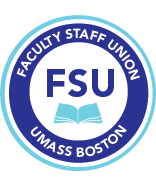The Point: Necessary Fictions and Cognitive Dissonance
11/22/2021
Greetings, Colleagues:
Full disclosure: this is the first of a series of messages you will be getting in the coming days about how collective bargaining is unfolding. I get to kick things off but before long you will also hear from FSU President Steve Striffler, and also directly from our core bargaining team and contract action team. It might seem like a lot, but it is—I promise—important.
All I want to do is capture what it feels like to attend bargaining sessions and make another push to encourage you to attend at least one session: I used to be able to describe the action as the sessions were unfolding, but as I have reported here recently, administration insisted on a “no live messaging” rule before they would agree to extend our memo of understanding surrounding expanded bargaining. It is within administration’s right to try to establish “ground rules” like this, but the only new condition they set for this round of bargaining was that faculty and librarians not communicate publicly with each other or the larger surrounding community about these consequential proceedings while they take place.
We call what we are engaged in “collective” bargaining: I have not been clocking things precisely, but I’d venture a guess that 75% of the time we spend at collective bargaining sessions are not collective at all but spent in our respective union and management caucus rooms. (Our caucus is always dynamic, interesting, and inspiring!) This is not uncommon, but I have to say that after months of administration ignoring our requests for information, summarily denying proposals from our side or trying to kill them with “poison pill” contingencies (more on this in a second), and so on, it does not always feel like administration has any sense of urgency about settling a contract with us. I don't think this is accidental: dilatory, intransigent, withholding—these seem to be some of the keywords in the administration’s negotiating playbook.
There is always a bit of cognitive dissonance I feel when I observe bargaining sessions. If you attend a bargaining session, you will quickly learn that most of the talking on their side is done by people you don’t really know or engage with in your regular work life—mostly by a relatively recently hired lawyer with the title “Senior Director of Labor and Employee Relations.” The relative silence of our chief academic officer during the sessions is noteworthy: is this the same provost who earlier in the week sent us a cheering holiday message organized around the promiscuous use of the first-person plural and assurances that together we can “take charge of our own destiny” and “fully realize our immense potential”? In the most recent session he sat silently while one of his colleagues insisted that the already-overworked librarians in our unit can only have a modest bump in promotional raises and salary floors if we agree to accept the aforementioned “poison pill”—that there be literally no cap on the number of hours they work per week. It is not hard to descry the good-cop/bad-cop dynamic as it flickers into view, but…wow.
I am not naïve. I know that for an institution like ours to function we all have to agree to some necessary fictions—that, for instance, we are all on one team, working to meet the larger goals of our urban mission and our role as a research university. But if you come to a bargaining session I think it will soon become evident that administration is not treating you like a teammate: their unwillingness to make a single proposal that would benefit faculty, librarians, or students, their lack of preparation (which, of course, might actually be a tactic), and the evident disrespect upper administration shows for the multiple roles played by NTT faculty on campus all bespeak a much different relationship.
It might be time consciously to repudiate the teamwork allegory and fight together as a union for our membership and for the common good. Do you have time to attend one of the remaining bargaining sessions and see some of this for yourself? Do you have special skills—any forensic accountants out there who want to lend a hand as we study budget issues?—that might help us all? Don’t be shy!
Stay tuned for more on the nitty gritty of this year’s collective bargaining.
This is your union! Let us know at fsu@umb.edu how you want to get involved with bargaining in the coming months.
Sincerely,
Jeff Melnick
American Studies Department
Communications Director, Faculty Staff Union Executive Committee
For information on the FSU, links to our contract and bargaining updates, and a calendar of events, see the FSU webpage
